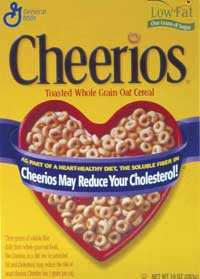Packaged foods can present misleading health claims, cleverly tip-toeing around the laws that govern them. But sometimes, the FDA will say enough is enough.
Cheerios, the long-time favorite breakfast cereal, is making a claim that the FDA just can’t let fall through the cracks. The agency sent a warning letter to General Mills, telling them that they can’t label Cheerios as a treatment for high cholesterol and heart disease.
The FDA points to language on the Cheerios label:
“Did you know that in just six weeks Cheerios can reduce bad cholesterol by an average of four percent? Cheerios is … clinically proven to lower cholesterol. A clinical study showed that eating two 1.5 cup servings daily of Cheerios cereal reduced bad cholesterol when eaten as part of a diet low in saturated fat and cholesterol.”
While it is OK to link soluble fiber from whole-grain oats with a lower risk of coronary heart disease, “it’s not okay to separate the heart disease and cholesterol claims,” according to the FDA.
The FDA also takes issue with claims from a website General Mills advertises on Cheerios boxes. For instance, whole-grain foods can’t be linked alone to helping with heart disease, but is supposed to mention fiber, fruits, vegetables, and a low-fat diet.
In this case, the false claims are subtle, but maybe that makes it worse because it seems all the more sneaky.
